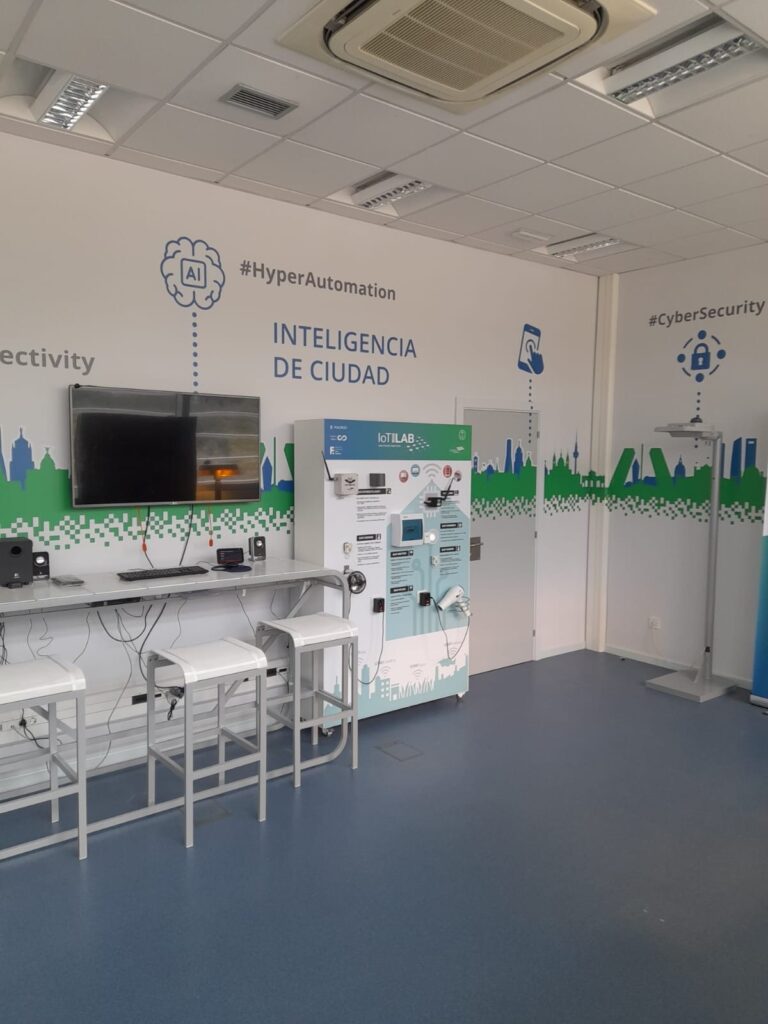Inauguration of the IoT Laboratory of the City of Madrid

13 March, 2023
The Madrid City Council inaugurates today the Internet of Things Laboratory of the City of Madrid, IoTMADLAB, a result of the collaboration agreement signed with the Polytechnic University of Madrid and funded by the Business Forum for Madrid.
This initiative is part of the Madrid Digital Capital transformation strategy presented by the City Council last November. It comprises three main objectives: to achieve the best digital services for individuals, to endow the city with intelligence, and to strengthen Madrid’s position as a digital innovation hub. This laboratory is inspired by and addresses these three goals.
Regarding the goal of being a hub for digital innovation, it is based on public-private collaboration. Thus, the laboratory is directly financed by contributions from the companies of the Business Forum for Madrid. Additionally, it reinforces cooperation between institutions to maximize the city’s digital capabilities. The City Council has signed an agreement for the creation and development of this Laboratory with the Polytechnic University of Madrid, a neutral hub that supports the City Council, businesses, and society in defining a standard for the city’s hyper-connectivity through interoperability.
The main innovative contribution of the IoTMADLAB is the definition of a standard allowing Madrid’s facilities and installations to use a common language for connection and understanding. To achieve this, collaboration with technology providers, service providers to the city, and the various technical managers of municipal services is essential. This laboratory aims for innovation and excellence in digital services, leveraging the capabilities and opportunities offered by connecting equipment, objects, and applying emerging technologies such as artificial intelligence, virtual reality, blockchain, and cybersecurity.
Regarding the axis of endowing the city with intelligence, the millions of pieces of equipment and installations operating in the municipality are connecting via the Internet of Things, advancing evidence-based management, and building an open, interoperable, and cyber-secure city.
And all of this, while prioritizing offering the best digital services to those who live, study, work, invest, visit, or enjoy Madrid. Providing this city intelligence ensures that people receive the best services based on their environment and characteristics. For instance, when a pedestrian crosses a zebra crossing, the lighting intensity increases, and nearby lampposts could even flash to alert drivers; or lighting intensity can be increased in school corridors or in specific situations to enhance safety.
This hyper-connectivity allows the construction of smart urban spaces to apply emerging technologies and achieve the benefits they may provide: increased safety, better service, reduced consumption, decreased emissions, and a better response to the needs of individuals, businesses, and the city itself.
Thus, the collaboration agreement with the Polytechnic University of Madrid includes the implementation of smart urban spaces, demonstration centers in various parts of the city, to measure their impact and involve people in their design and configuration. This also involves conducting citizen workshops, conferences, and seminars.
This aligns with the three objectives of the Madrid Digital Capital transformation strategy, placing people at the center of technology application projects, promoting scientific and technological vocations and STEAM competencies, and conducting workshops to facilitate understanding the benefits of applying the Internet of Things in the city and people’s daily lives, especially the elderly and vulnerable groups.
The IoTMADLAB is a firm commitment to building the city of tomorrow today. It has attracted the interest of European institutions such as Eurocities and the European Network of Living Labs and businesses and service operators. It also aligns with the Govtech promotion program for the support of tech-based start-ups and scale-ups, as well as talent generation with new digital profiles, all as a source of investment attraction and creation of tech and service companies. This stems from placing people and improved management and efficiency of municipal services at the heart of city digitalization.
Related links:
Related news

Madrid City Council Awarded for its Smart City Project
28 September, 2023 The Madrid City Council has won the “Silver Seoul Smart City” award in the “Technological Innovation Project” category for the project “Madrid Data-Based, City Intelligence”. This award is granted by the World Organization of Sustainable and Smart Cities. Fernando de Pablo, general director of the Digital Office of the Madrid City Council, […]

IoT Laboratory City of Madrid introduces itself to the companies of the Business Forum for Madrid
20 September, 2023 The IoT Laboratory City of Madrid was established on July 1, 2022, through an agreement between the Madrid City Council and the Polytechnic University of Madrid, funded by the Business Forum for Madrid. This event on November 18th is organized to introduce the capabilities of the Laboratory to the companies of the […]

Inauguration of the IoT Laboratory of the City of Madrid
13 March, 2023 The Madrid City Council inaugurates today the Internet of Things Laboratory of the City of Madrid, IoTMADLAB, a result of the collaboration agreement signed with the Polytechnic University of Madrid and funded by the Business Forum for Madrid. This initiative is part of the Madrid Digital Capital transformation strategy presented by the […]
